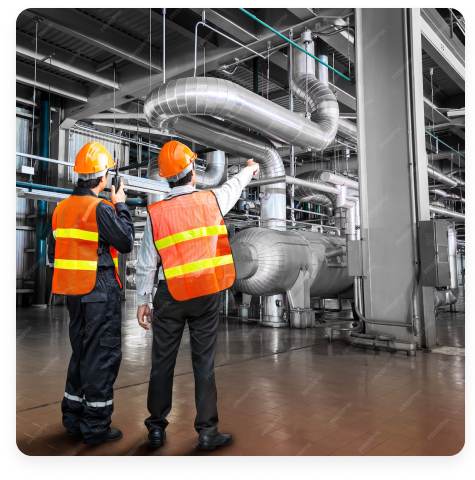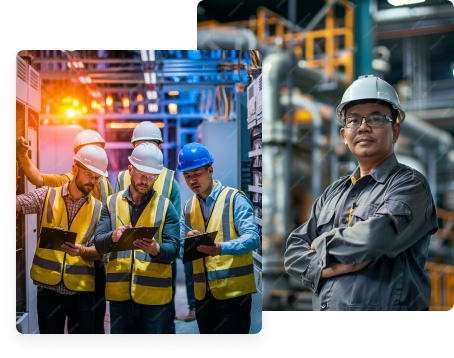ASME Section VIII Division 1 & 2 - Pressure Vessel
5-day training on ASME Section VIII Div. 1 & 2 standards. Led by international experts in Indonesia & Malaysia
Level
Intermediate
Type
Facetoface

Trusted by Leading Companies
Our training programs are promoted to engineers, supervisors, and technical teams across the globe, supporting their continuous development and operational competency.












About Training
How to adopt code rules for different types of vessels and with various service conditions will be illustrated with numerous case studies.
Training Objectives
- Familiarize participants with the concepts and technical terms of the codes
- Know the basic concepts of the codes and their design fundamentals
- Understand salient features and differences between Div 1 and Div 2
- Know the design of the Shell, Heads, and other pressure parts
- Learn the design of nozzles and nozzle reinforcements
- Design for external pressure and Jacketed vessels
- Design requirements for low-temperature operation
- Discover the fabrication requirements, assembly, and welding requirements.
- NDT and Inspection procedures
- How to carry out pressure testing, certification, and stamping of Pressure Vessels.
- Introduction to Integrity assessment of in-service vessels.
Audiences
What is ASME Section VIII Division 1 & 2 - Pressure Vessel training course objective?
- Design Engineers / Managers
- Mechanical Engineers / Managers
- Maintenance Engineers / Managers
- QAQC Engineers / Managers
- Inspection Engineers / Managers
- Reliability Engineers / Managers
Instructor
MM
Mandar Mulay
Mandar Mulay has about 20 years hands on experience in design and integrity assessment of Piping Systems, Reactors & Storage Tanks, Pressure Vessels, Power Boiler, and Heat Exchanger. He is well conversant with the major industry codes & standards such as ASME Sec. I, ASME B 31.1, B31.3 , B31.4 and B31.8, ASME Sec VIII, BS-5500, TEMA, API -650, IS 803, API 579, ASME PCC-2 etc.
Major projects closely associated with, in his professional career so far are, Qatar Chemicals, Shell, Castrol India, Reliance Industries, Cargill Foods USA, etc. His proficiency in Power Boiler, Piping and Pressure Vessel Codes enables him to trace the similarities and differences of these codes. He also actively involved as Instructor for programs on the subjects of ASME codes, Integrity Assessment, Fitness for Service, etc.
Along with his career in Engineering and Design Department in a multinational company at a very senior post for the last 20 years, he is also visiting faculty to a well known Engineering College in India for their P.G. Courses in Piping Design and Engineering
Apart from being visiting faculty, He has also conducted several Training Courses ( ASME Sec. I, ASME Sec. VIII, ASME B 31.3 Piping Codes , API 579 FFS code, ASME PCC-2 Repair practices, and Heat Exchanger Design Operations & Maintenance ) in Saudi Arabia, Qatar, Bahrain and UAE for engineers from companies like Saudi Aramco, SABIC group of Companies, Qatar Petroleum, ADNOC, BAPCO, DEWA, Gulf Petrochemicals etc. He has already conducted many times the training courses in API 579, where the participants rated him “Excellent” for these courses.
Daily Aims
- Introduction to ASME codes
- Structure of ASME Sec. VIII Div. 1
- ASME Code system : Code revisions, Editions and addenda
- Pressure vessels included in ASME Codes
- Pressure vessels excluding from ASME codes
- Design principles adopted in ASME codes,
- Design rules, How these were derived and arrived at
- Concept of working pressure, design pressure, MAWP
- Allowable stress in ASME design
- Weld joint categories
- Weld joint types
- Concept of weld joint efficiency
- Design of cylindrical and spherical shells under internal pressure
- Static head calculations
- MAWP calculations
- Types of dished heads.
- Selection of dished heads based on pressure / Diameter
- Design of Ellipsoidal heads.
- Design of Torispherical heads
- Design of Hemispherical heads
- Design of conical heads
- Case Studies and examples
- Nozzles and openings, reinforcement of openings
- Adequacy of weld joints for shells and nozzles
- Methods of design optimization, economical compliance.
- Quality Assurance System as per ASME codes
- Materials for pressure parts
- Materials for non-pressure parts
- Requirement of low temperature service
- Deciding impact test requirement
- Impact test exemptions
- Impact test acceptance criteria
- Fabrication requirements
- Forming and ovality
- Weld fit-ups and mis-alignments
- Weld reinforcements
- Weld – metal build-up
- Weld joints in shells
- Weld joints for nozzle attachments
- Deciding PWHT requirement
- PWHT methods
- PWHT temperature, time
- Heating / cooling rates
- Deciding nozzle orientations
- Requirements of man-ways and inspection openings
- NDT of pressure vessels
- Selection of NDT methods
- Code requirement for radiography
- Acceptance criteria for elongated and rounded indications
- PT and MT requirements
- Acceptance criteria for PT and MT
- Hydrostatic and Pneumatic Tests
- Requirements for Pressure Gauges for pressure test
- Calculating test pressures, Inspection pressures, pressurization stages and safety relief valve settings
- Test temperatures, Temperature Corrections
- Vessel stamping and Name plate
- Introduction to Integrity assessment of in-service vessels
- Introduction to ASME Sec. VIII Div.2
- Salient features of ASME Sec. VIII Div.2
- Basic differences between ASME VIII Div. 1 and ASME VIII Div. 2.
- Allowable Stress Basis and Safety factors for design
- User’s design specification (UDS)
- Materials Permitted For Construction of Vessel Parts
- Supplemental Requirements for Carbon and Alloy Steels
- Material Test Requirements
- Deciding impact test requirement
- Stress ratio calculations
- Impact test exemptions
- Impact test acceptance criteria
- “Design by Rule” requirements
- Minimum Thickness Requirements
- Weld Category
- Weld Joint Type
- Types of Joints Permitted
- Design Rules for Shells Under Pressure
- Shell Tolerances
- Cylindrical Shells
- Conical Shells
- Spherical Shells and Hemispherical Heads
- Torispherical Heads
- Ellipsoidal Heads
- Fabrication Requirements
- Fitting and Alignment
- Preheating and Heat Treatment of Weldments
- PWHT methods
- PWHT temperature, time
- Heating / cooling rates
- Examination groups for pressure vessels
- Radiography and UT requirement-Volume NDT
- PT and MT requirements-Surface NDT
- Acceptance criteria for NDT
- Pressure Testing Requirements
- Hydrostatic and Pneumatic Tests
- Requirements for Pressure Gauges for pressure test
- Calculating test pressures, Inspection pressures, pressurization stages.
- Test temperatures, Temperature Corrections
- Vessel stamping and Name plate
- Case studies on Div 1 and Div 2
- Doubts and discussions
Training Schedule
| Code | Start Date | End Date | Locations | Cost | Instructor |
|---|---|---|---|---|---|
| PST0179-202601 | 13 Apr, 2026 | 17 Apr, 2026 | Bandung, Indonesia | USD 3350 | Mandar Mulay |
| PST0179-202602 | 18 May, 2026 | 22 May, 2026 | Kuala Lumpur, Malaysia | USD 3350 | Mandar Mulay |
| PST0179-202603 | 10 Aug, 2026 | 14 Aug, 2026 | Bandung, Indonesia | USD 3350 | Mandar Mulay |
| PST0179-202604 | 14 Dec, 2026 | 18 Dec, 2026 | Kuala Lumpur, Malaysia | USD 3350 | Mandar Mulay |
Why Choose This Training
Credibility
Align with API/ASME standards. Trusted by major operators.
Expert Instructors
Led by industry veterans with real field experience.
Real Case Studies
Practical application of concepts through real world scenarios.
Practical Skills
Hands on calculations and decision making for FFS outcomes.
Trusted by Operators
Delivered to Aramco, ADNOC, SABIC, and other major operators.
Global Training Standard
Recognized across major industries by PetroSync's proven approach.
Professional Training Aligned with Industry Standards
Practical, industry ready training designed for real work environments
Limited seats available

Frequently Asked Questions
-
Direct Transfer
PetroSync Global Pte Ltd Bank Details:
- Account Name: PetroSync Global Pte Ltd
- Bank Name: DBS Bank Ltd
- Bank Code: 7171
- Bank Swift Code: DBSSSGSGXXX
- Branch Code: 288
- Account No: 0288-002682-01-6-022 (USD)
- Bank Address: 12 Marina Boulevard, Level 3, Marina Bay Financial Centre Tower 3, Singapore 018982
-
Terms & Conditions:
- For payment via direct telegraphic transfer, clients must bear both local and overseas bank charges.
-
Credit Card:
Terms & Conditions:
- A 4% credit card processing fee applies for credit card payments.
- Delegates who cancel after the training has been officially confirmed via email are required to pay the full course fee, and no refunds will be granted. However, you may substitute delegates at any time as long as reasonable advance notice is given to PetroSync.
- If PetroSync cancels, postpones, changes the trainer, or alters the training location (classroom/virtual) for any reason, and the delegate is unable or unwilling to attend on the rescheduled date, a 100% credit voucher of the paid contract fee will be issued. This credit voucher can be used for another PetroSync training program, subject to mutual agreement, within one year from the postponement date.
- PetroSync is not responsible for any loss or damage resulting from the cancellation policy and assumes no liability if the event is canceled, rescheduled, or postponed due to force majeure (e.g., natural disasters, war, government actions, industrial actions).
If PetroSync cancels, postpones, changes the trainer, or alters the training location (classroom/virtual) for any reason, and the delegate is unable or unwilling to attend on the rescheduled date, a 100% credit voucher of the paid contract fee will be issued. This credit voucher can be used for another PetroSync training program, subject to mutual agreement, within one year from the postponement date.
Yes, participants who complete the training will receive either an attendance certificate or a completion certificate, depending on the course requirements.
Yes, PetroSync courses adhere to international standards , with expert instructors in fields such as API, ASME, Reliability, and Drilling & Well Engineering.
Yes, PetroSync certificates are widely recognized and can be used to fulfill professional development and certification requirements across various industries.
Yes, PetroSync offers customized training programs tailored to your organization's specific needs (In-house Training).
Participants will receive comprehensive training materials , including slides, handouts, and direct learning from experts with case studies related to the training topic.
PetroSync trainers are industry experts with extensive experience as instructors and consultants in their respective fields, providing professional training with a strong background in the industry.
Yes, trainer profiles, including their qualifications, experience, and expertise, are available on the website: https://www.petrosync.com/training/.
Online training sessions are conducted via user-friendly platforms such as Zoom Premium.
To access PetroSync Online Training, participants need:
- A computer or laptop (tablets or smartphones are not recommended)
- A reliable broadband internet connection (minimum 4 Mbps)
- A webcam and a headset
- Any internet browser (Chrome browser recommended for a better experience)
- A reasonably quiet place
Yes, PetroSync provides live Q&A sessions with instructors to address real-world challenges encountered during training.
The average number of participants varies depending on the topic and participants’ schedules.
- The information you provide will be safeguarded by PetroSync and may be used to keep you informed of relevant products and services.
- As an international group, we may transfer your data globally for the purposes indicated above.
- If you do not wish to share your information with other reputable companies, please tick the box on the registration form.
Please fill out the form on the designated page first. Our team will reach out to you within a maximum of 2x24 hours.
The latest training schedule is available on the website: https://www.petrosync.com/training/.
